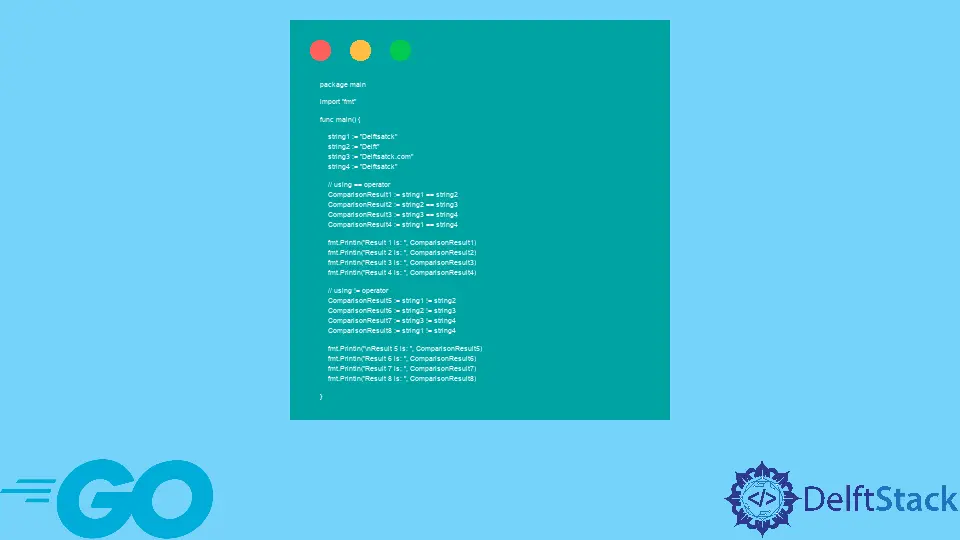How to Compare Strings in Go
-
Use the
Compare()Method to Compare Strings in GoLang - Use Comparison Operators to Compare Strings in GoLang

This tutorial demonstrates how to compare strings in GoLang.
GoLang has two methods to compare strings: the built-in method Compare() and the other is a comparison by GoLang comparison operators. This tutorial demonstrates these two methods to compare strings in GoLang.
Use the Compare() Method to Compare Strings in GoLang
The built-in method Compare() in GoLang is used to compare two strings. This method uses the lexicographical order to compare two strings; the syntax for this method is:
func Compare(a, b string) int
Where a and b are the two strings to be compared, it returns an integer value. There are three return types based on the comparison of strings.
- If a == b then
compare()method will return 0. - If a > b then
compare()method will return 1. - If a < b then
compare()method will return -1.
Let’s try an example to compare strings using the Compare() method.
package main
import (
"fmt"
"strings"
)
func main() {
var string1 = "x"
var string2 = "y"
var string3 = "Delftstack"
var string4 = "Delftscope"
// string1 < string2 should return -1
fmt.Println(strings.Compare(string1, string2))
// string2 > string1 should return 1
fmt.Println(strings.Compare(string2, string1))
// string1 == string1 should return 0
fmt.Println(strings.Compare(string1, string1))
// string3 > string4 should return 1
fmt.Println(strings.Compare(string3, string4))
// string4 < string3 should return -1
fmt.Println(strings.Compare(string4, string3))
// Let's create a condition
string5 := "Hello this is delftstack.com!"
string6 := "Hello this is DELFTSTACK.COM!"
// using the Compare function
if strings.Compare(string5, string6) == 0 {
fmt.Println("The strings are a match.")
} else {
fmt.Println("The strings do not match.")
}
}
The code above tries to compare strings using the Compare() method and returns the integers described above. The code also creates a condition based on the returned integer.
See the output:
-1
1
0
1
-1
The strings do not match.
Use Comparison Operators to Compare Strings in GoLang
GoLang also supports the comparison operators as in other languages; these comparison operators include ==, !=, >=, <=, <, >. The == and != are used to check the equality of strings, and the other four are used to compare the strings in lexicographical order.
These comparison operators return Boolean operators, i.e., true and false. Let’s try an example first using the == and != operators.
package main
import "fmt"
func main() {
string1 := "Delftsatck"
string2 := "Delft"
string3 := "Delftsatck.com"
string4 := "Delftsatck"
// using == operator
ComparisonResult1 := string1 == string2
ComparisonResult2 := string2 == string3
ComparisonResult3 := string3 == string4
ComparisonResult4 := string1 == string4
fmt.Println("Result 1 is: ", ComparisonResult1)
fmt.Println("Result 2 is: ", ComparisonResult2)
fmt.Println("Result 3 is: ", ComparisonResult3)
fmt.Println("Result 4 is: ", ComparisonResult4)
// using != operator
ComparisonResult5 := string1 != string2
ComparisonResult6 := string2 != string3
ComparisonResult7 := string3 != string4
ComparisonResult8 := string1 != string4
fmt.Println("\nResult 5 is: ", ComparisonResult5)
fmt.Println("Result 6 is: ", ComparisonResult6)
fmt.Println("Result 7 is: ", ComparisonResult7)
fmt.Println("Result 8 is: ", ComparisonResult8)
}
The code above will compare the given strings based on equality and inequality. See the output:
Result 1 is: false
Result 2 is: false
Result 3 is: false
Result 4 is: true
Result 5 is: true
Result 6 is: true
Result 7 is: true
Result 8 is: false
Now let’s try an example using the >=, <=, <, > operators to compare strings by their lexicographical order. See example:
package main
import "fmt"
func main() {
string1 := "Delftsatck"
string2 := "Delft"
string3 := "Delftsatck.com"
string4 := "Delftsatck"
// using < operator
ComparisonResult1 := string1 < string2
ComparisonResult2 := string2 < string3
ComparisonResult3 := string3 < string4
ComparisonResult4 := string1 < string4
fmt.Println("Result 1 is: ", ComparisonResult1)
fmt.Println("Result 2 is: ", ComparisonResult2)
fmt.Println("Result 3 is: ", ComparisonResult3)
fmt.Println("Result 4 is: ", ComparisonResult4)
// using > operator
ComparisonResult5 := string1 > string2
ComparisonResult6 := string2 > string3
ComparisonResult7 := string3 > string4
ComparisonResult8 := string1 > string4
fmt.Println("\nResult 5 is: ", ComparisonResult5)
fmt.Println("Result 6 is: ", ComparisonResult6)
fmt.Println("Result 7 is: ", ComparisonResult7)
fmt.Println("Result 8 is: ", ComparisonResult8)
// using >= operator
ComparisonResult9 := string1 >= string2
ComparisonResult10 := string2 >= string3
ComparisonResult11 := string3 >= string4
ComparisonResult12 := string1 >= string4
fmt.Println("\nResult 9 is: ", ComparisonResult9)
fmt.Println("Result 10 is: ", ComparisonResult10)
fmt.Println("Result 11 is: ", ComparisonResult11)
fmt.Println("Result 12 is: ", ComparisonResult12)
// using <= operator
ComparisonResult13 := string1 <= string2
ComparisonResult14 := string2 <= string3
ComparisonResult15 := string3 <= string4
ComparisonResult16 := string1 <= string4
fmt.Println("\nResult 13 is: ", ComparisonResult13)
fmt.Println("Result 14 is: ", ComparisonResult14)
fmt.Println("Result 15 is: ", ComparisonResult15)
fmt.Println("Result 16 is: ", ComparisonResult16)
}
The above strings will now be compared based on the lexicographical order. See the output:
Result 1 is: false
Result 2 is: true
Result 3 is: false
Result 4 is: false
Result 5 is: true
Result 6 is: false
Result 7 is: true
Result 8 is: false
Result 9 is: true
Result 10 is: false
Result 11 is: true
Result 12 is: true
Result 13 is: false
Result 14 is: true
Result 15 is: false
Result 16 is: true
Sheeraz is a Doctorate fellow in Computer Science at Northwestern Polytechnical University, Xian, China. He has 7 years of Software Development experience in AI, Web, Database, and Desktop technologies. He writes tutorials in Java, PHP, Python, GoLang, R, etc., to help beginners learn the field of Computer Science.
LinkedIn Facebook